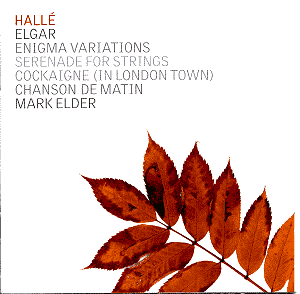If you want something out of the ordinary in terms
of Elgar fare, then there’s four minutes on this disc which should
extend your collection; but that’s not to dismiss the rest out
of hand.
Mark Elder is making something of a name for
himself as an Elgarian, and is in the best of possible places
to do so considering that his predecessors in his post in Manchester
include Richter, Harty and Barbirolli. On the other hand that
roll call could make it a hard act to follow. The full orchestra
is listed at the back of the booklet, and one wonders how many
of them were playing in Barbirolli’s day thirty odd years ago,
for the three conductors listed above formed a fairly continuous
line to pass on the tradition, while Elgar himself was a frequent
guest and friend to all three men. That does not happen these
days. Now we have moved on, the Free Trade has given way to the
Bridgewater Hall. Elder has recorded this mostly familiar Elgarian
fare, starting with a radiant account of Enigma which,
apart from an opulent degree of lingering at the end of C.A.E.,
gets straight to the heart of each personality and its idiosyncrasies.
The strings surmount the Mendelssohnian skittishness of Steuart-Powell
with ease and rush up and down the stave in Troyte with impressive
unanimity of ensemble and intonation, while finding a radiance
with which to suffuse both Meath Baker and Jaeger in glorious
tone. Of the many fine solos Lynsey Marsh’s clarinet is outstanding
in the Romanza and as Ysobel, so too Hugh McKenna’s personification
of Winifred Norbury’s trilling. The two of them fuse together
in Dorabella’s stuttering habits. Listen out in her variation
for more than pp moments in Graham Salvage’s bassoon playing
(figure 39-40), which bring out details not usually heard here.
Whilst on the subject of pianissimo, the start of Nimrod
is magically quiet as the first violins sustain their G between
variations, followed by a solemnly paced account with arching
phrasing and an eye for detail, including some highlighting of
lovely moments for cellos. Dan the bulldog makes a stunningly
virtuosic leap, paddle, and barking shake during his brief appearance,
while Basil Nevison never played the cello as finely as Peter
Worrall does to start and conclude his variation. A rough hewn
finale packed with detail, complete with organ, concludes this
thrilling account.
If you like your string playing liberally coated
with portamento, then the performance of the Serenade for
Strings is one you will surely enjoy. It’s an account which comes
from the heart, eloquently shaped and delicately paced from first
note to last. Cockaigne gets an energetically vital interpretation
from Elder in Wagnerian Elgar (Die Meistersinger
is so often recalled here and, as it happens, was the opera Elder
conducted in his one and only foray into the political maelstrom
of Bayreuth in 1981). The rest of the disc is a gentle-spirited
Chanson de matin followed by a revisit to Enigma,
with the original finale (a substantial 96 bars shorter than we
are used to and without the organ) which Jaeger and (according
to him) Richter thought too abrupt a conclusion. Actually this
original ending is rather good but they were probably right, though
Elgar accepted the advice with grudging reluctance.
After some dubious appointments by the orchestra
in more recent years, Mark Elder has undoubtedly done wonders
for the Hallé since he took up the post in 2000. Long may
his own era last.
Christopher Fifield
